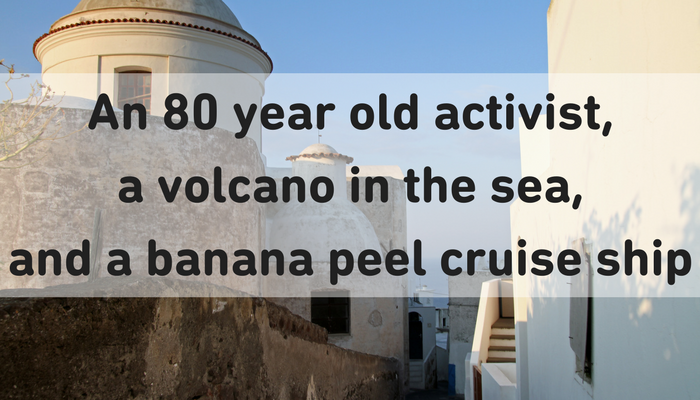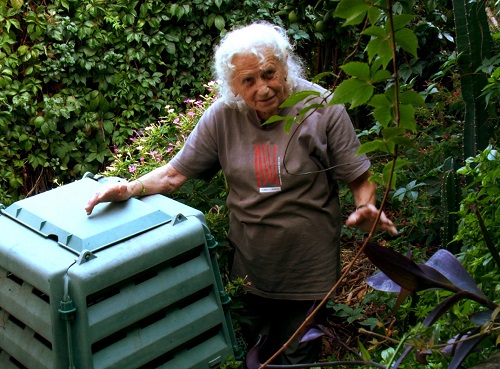An 80 year old activist, a volcano in the sea, and a banana peel cruise ship


Written by Nina Thomas, Volunteer Content Creator for Zero Waste Europe
From the air, the island of Stromboli, located off the north coast of Sicily in the Tyrrhenian Sea, appears quite literally as a volcano, a jagged rock rising from the sea. In fact, it is one of only three active volcanoes in all of Italy and a UNESCO world heritage site. On this little shard of land, there exists a town, and in that town one can find Aimée, an 80-year-old zero waste activist. While she might not label herself as such, her actions speak for themselves. Nowadays, you can find her tending to her 20-something cats, wandering through the cool alleyways, or buying fresh vegetables at the market. At first glance, she would seem like a local, born and bred. But her history with this island is different than one might expect, because Aimée is not Italian at all, she is French.
How did a French woman end up on this tiny island? The story goes something like this – she and her husband moved from France in the mid-seventies, in search of the quiet and charm of life in an Italian seaside village. After only a year of living there, her husband realised the village life didn’t quite suit him as much as he would have hoped and moved back to France. But Aimée had other ideas. During that year, she had fallen in love with the volcanic island in the sea, and had grown deeply attached to the smells, the sights, the people. So, she stayed and ended becoming something she could have never expected – a champion for a better waste management system and all around eco-warrior.
But Aimée came to this place to escape the dreariness of urban life, including the rubbish and pollution. Why on earth would she decide to take on this landfill sized burden? Well it seems Aimée was always of a practical mindset. A child of the war, she was always conscious of her consumption and careful to avoid excessive waste. Her pre-existing habits and values combined with her love of the island made for the perfect proactive equation.

So, what exactly are the waste issues of Stromboli? Like many holiday destinations, it exists in polar opposite states depending on the season. During the winter months, the island hosts a humble 400 residents, and that number booms to 20,000 in the summer. The brief intensity of summer brings about more trash than the island can handle, and for as long as the people can remember, Stromboli’s waste has been shipped back to Sicily in one unsorted jumble, usually going to the landfill, recyclables and all. Not only does this cause issues on the mainland, Stromboli’s streets are often littered with an assortment of wayward rubbish, looking for the right disposal bin. Instead, it makes its way down to the beach for a bit of sunbathing and finally a lifelong swim in the Mediterranean.
Organic waste is another component of this export to Sicily, which Aimée aptly coined the “banana peel cruise ship” to describe the somewhat gratuitous journey these humble little food bits make. She argues that using valuable fossil fuels to send these food leftovers abroad rather than compost them here on the island is quite literally a wasted opportunity.
As the world had rapidly entered the consumerist age, Stromboli never quite managed to establish an adequate method to manage the remnants of this consumption. And with each year, as thousands of satisfied tourists leave with happy memories shared through photos and conversation, Stromboli is rapidly becoming an established tourist destination. Business is booming, and so is waste generation.
The system was simply inadequate – it needed of a revamp, a sustainable way to sort all that trash! And while many people agreed with the idea, no one seemed to care enough to do anything about it. So Aimée decided to take the waste of Stromboli into her own hands. She contacted Paolo Garelli, the founder of Carreta Careta, a waste pick up system that had been installed in other cities facing similar waste management challenges to Stromboli. Carretta Caretta uses a grid system of waste collection spots across the town. People are given a calendar which tells them what day they can bring specific waste types to the spot where a tiny waste lorry is waiting. Ideally people do not have to walk more than 150 meters to dispose of ALL waste, including e-waste, green waste, and standard recyclables. Carretta Caretta is the perfect system for many Sicilian islands, because it’s pint sized pick up vehicles are able to manoeuvre the narrow streets and paths.
Even with no financing officially in place, Paolo agreed and in the winter of 2010, Aimée and Paolo began to implement the system. For Caretta Carretta to work, the citizens of the town need to be proactive and engaged with the concept and according to Paolo and Aimée, the people of Stromboli were enthusiastic about the idea. The first week in action, there was a bit of confusion regarding waste separation, but was fairly standard according to Paolo. A bit of extra communication seemed to resolve this confusion, and after that week people happily adhered to the calendar. For the first 20 days, things seemed to be progressing well and Stromboli had never looked so clean.

With every change come a few naysayers, and this project was no exception. Unfortunately, this particular naysayer, had some influence over the happenings in Stromboli. His name was Mario Cincotta – he ran a nightclub and a few restaurants on the island, and liked to consider himself the unofficial mayor around town. The Cincotta family had lived on Stromboli for many generations, and Mario not only took pride in this but also used it as justification to impose his will. So, when Caretta Caretta’s jolly trucks began to appear, the natural order (according to Mario) of the island was upset. How dare this strange mainlander come here and impose his silly ideas? This excessive waste separation simply would not do – Mario challenged the project and within ten days, Caretta Caretta evaporated into the air like the smoke of the volcano just beyond the town. His only response when asked why? “It just wasn’t working”.
The thing is, Caretta Caretta WAS working. People were excited, the village was noticeably cleaner, and the new system seemed to be a viable alternative to a decades long problem. No, this was not an issue of not working, it was something more subtle and deep. It was an issue of clinging to the remnants of a different world, one before climate change, before regulation, and before plastic ruled the seas. It was the conflict of the old way versus the new, of what once was and what is, of the power dynamics that ran deep in this old town. And it was bigger than just Mario. This moment highlighted the fact that the Strombolian municipality was not necessarily operating for the good of the people and the environment.
While the little lorries no longer amble through the narrow alleyways, Caretta Caretta cannot be considered a failure. Rather than admitting defeat, Aimée realised it was simply not the right time. It was her attachment to this place that drove her to action, and it was the residents that stood behind her that brought her vision to life. This project empowered the community through conversation and choice. The people of the island had been given the opportunity to engage with a new and more sustainable future. It was an idea that some had never even entertained, yet now that it had come, and the seed was planted. For many, that seed would lie dormant, a pleasant memory of correctly sorted waste. However, the next time a sustainable measure came along the people would be familiar and perhaps that seed would shoot through the dark soil into the hot Italian sunshine.
At the moment, Aimée has redirected her efforts. If she couldn’t control all the waste of Stromboli, she would address the problem nearest to her heart – the banana peel cruise ship. Coincidentally, Italy has just passed a law allowing community composting. Because of this the country has seen a dramatic increase in community compost machines and Aimée knew this was exactly what Stromboli needed. Once again, Aimée spread the idea, garnered support, and the town has just placed an order for the charmingly named “Big Hanna”. The Big Hanna machines were invented by a Swedish sociologist in 1991, with the desire to raise “awareness around misused resources and how dependent we are on our local and global environments. The machines are essentially large metal bins that automatically aerate and turn the contents, minimizing odor and accelerating decomposition time to approximately 6 to 10 weeks. Once the process is complete, nutrient rich soil awaits you on the other end. While Big Hanna has yet to arrive, Aimée lives each day with the vision of a healthy and vibrant Stromboli, alive with culture and community, and a whole lot of compost.
And is Aimée concerned with what Mario has to say about the composter? “I didn’t ask, and I will not ask, what he thinks. To me, the only existing power is the law which respects economic convenience for its citizens. The law on community composting is the only thing that matters. Who know, maybe we will go back to the Carretta Caretta. But first, let’s settle the organic waste matter. This way, we remove one bullet point from a long list of materials (wastes) that the municipality and other waste management institutions have to take care of. The organic waste is OURS. It belongs to the island and its people, us”
And there you have it. Aimée’s story shows that outdated ways of thinking and biased administrative system are no match against a clear vision, a strong community and persistence. Oh, and also that it’s never too late to start fighting for what you believe in.